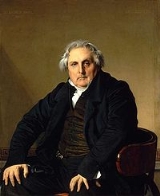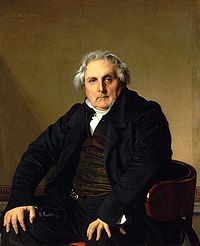
Louis-François Bertin
Encyclopedia

French people
The French are a nation that share a common French culture and speak the French language as a mother tongue. Historically, the French population are descended from peoples of Celtic, Latin and Germanic origin, and are today a mixture of several ethnic groups...
journalist. He had a younger brother - Louis-François Bertin de Vaux
Louis-François Bertin de Vaux
Louis-François Bertin de Vaux was a French journalist.Louis was the younger brother of Louis-François Bertin. He took a leading part in the conduct of his brother's paper Journal des Débats, to the success of which his powers of writing greatly contributed...
(1771–1842), two sons - Edouard François (1797–1871) and Louis-Marie François (1801–1854), and a daughter - Louise Bertin
Louise Bertin
Louise-Angélique Bertin was a French composer and poet.Louise Bertin lived her entire life in France. Her father, Louis-François Bertin, and also her brother later on, were the editors of Journal des débats, an influential newspaper. As encouraged by her family, Bertin pursued music...
.
Early career
Born in ParisParis
Paris is the capital and largest city in France, situated on the river Seine, in northern France, at the heart of the Île-de-France region...
(his father was a former secretary of Étienne François, duc de Choiseul
Étienne François, duc de Choiseul
Étienne-François, comte de Stainville, duc de Choiseul was a French military officer, diplomat and statesman. Between 1758 and 1761, and 1766 and 1770, he was Foreign Minister of France and had a strong influence on France's global strategy throughout the period...
), and considered in retrospect the most important member of the Bertin family, he began his journalistic career by writing for the Journal Français and other papers during the French Revolution
French Revolution
The French Revolution , sometimes distinguished as the 'Great French Revolution' , was a period of radical social and political upheaval in France and Europe. The absolute monarchy that had ruled France for centuries collapsed in three years...
. After Napoleon Bonaparte
Napoleon I of France
Napoleon Bonaparte was a French military and political leader during the latter stages of the French Revolution.As Napoleon I, he was Emperor of the French from 1804 to 1815...
's 18 Brumaire Coup
18 Brumaire
The coup of 18 Brumaire was the coup d'état by which General Napoleon Bonaparte overthrew the French Directory, replacing it with the French Consulate...
he founded the conservative
Conservatism
Conservatism is a political and social philosophy that promotes the maintenance of traditional institutions and supports, at the most, minimal and gradual change in society. Some conservatives seek to preserve things as they are, emphasizing stability and continuity, while others oppose modernism...
paper with which the name of his family has chiefly been connected, the Journal des Débats
Journal des Débats
The Journal des débats was a French newspaper, published between 1789 and 1944 that changed title several times...
. Guided by the contributions of figures such as Joseph Fiévée
Joseph Fiévée
Joseph Fiévée was a French journalist, novelist, essayist, playwright, civil servant and secret agent...
, Julien Louis Geoffroy
Julien Louis Geoffroy
Julien Louis Geoffroy was a French literary critic.He was born at Rennes, and educated there and at the Collège Louis le Grand in Paris. He took orders and for some time was a mere usher, eventually becoming professor of rhetoric at the Collège des Quatre-Nations. His tragedy, Caton, was accepted...
, Jean François Joseph Dussault, François-René de Chateaubriand
François-René de Chateaubriand
François-René, vicomte de Chateaubriand was a French writer, politician, diplomat and historian. He is considered the founder of Romanticism in French literature.-Early life and exile:...
, Charles-Marie-Dorimond de Féletz, Jean François Boissonade de Fontarabie
Jean François Boissonade de Fontarabie
Jean François Boissonade de Fontarabie was a French classical scholar.He was born at Paris. In 1792 he entered the public service during the administration of General Dumouriez. Driven out in 1795, he was restored by Lucien Bonaparte, during whose time of office he served as secretary to the...
, Conrad Malte-Brun
Conrad Malte-Brun
Conrad Malte-Brun , born Malthe Conrad Bruun, was a Danish-French geographer and journalist. His second son, Victor Adolphe Malte-Brun, was also a geographer.-Biography:...
, François Benoît Hoffmann
François Benoît Hoffmann
François-Benoît Hoffman was a French playwright and critic, best known today for his operatic librettos, including those set to music by Étienne Méhul and Luigi Cherubini .-Career:...
, and Charles Nodier
Charles Nodier
Jean Charles Emmanuel Nodier , was a French author who introduced a younger generation of Romanticists to the conte fantastique, gothic literature, vampire tales, and the importance of dreams as part of literary creation, and whose career as a librarian is often underestimated by literary...
, the Journal soon became a major authority in French press and literature. Bertin is credited with the invention of the feuilleton
Feuilleton
Feuilleton was originally a kind of supplement attached to the political portion of French newspapers, consisting chiefly of non-political news and gossip, literature and art criticism, a chronicle of the latest fashions, and epigrams, charades and other literary trifles...
, a supplement to the political section of a newspaper, usually in smaller type, which carried gossip, fashion, criticism, epigrams and charades, and which fostered a culture of literary gamesmanship.
Suspected of royalist
House of Bourbon
The House of Bourbon is a European royal house, a branch of the Capetian dynasty . Bourbon kings first ruled Navarre and France in the 16th century. By the 18th century, members of the Bourbon dynasty also held thrones in Spain, Naples, Sicily, and Parma...
tendencies by the French Consulate
French Consulate
The Consulate was the government of France between the fall of the Directory in the coup of 18 Brumaire in 1799 until the start of the Napoleonic Empire in 1804...
, he was imprisoned at the Temple
Temple (Paris)
The Temple was a medieval fortress in Paris, located in what is now the IIIe arrondissement. It was built by the Knights Templar from the 12th century, as their European headquarters. In the 13th century it replaced earlier works of the Vieille Temple in Le Marais...
in 1800, and exiled in 1801. Bertin returned to Paris in 1805, after the proclamation of the Empire
First French Empire
The First French Empire , also known as the Greater French Empire or Napoleonic Empire, was the empire of Napoleon I of France...
, and resumed the management of the paper, the title of which had been changed by order of Napoleon to that of Journal de l'Empire. He had to submit to a rigorous censorship
Censorship
thumb|[[Book burning]] following the [[1973 Chilean coup d'état|1973 coup]] that installed the [[Military government of Chile |Pinochet regime]] in Chile...
, and in 1811 the conduct, together with the profits, was taken over entirely by the government.
Restoration and July Monarchy
In 1814 he regained possession, restored the old title, and continued his support of the royalist cause during the Hundred DaysHundred Days
The Hundred Days, sometimes known as the Hundred Days of Napoleon or Napoleon's Hundred Days for specificity, marked the period between Emperor Napoleon I of France's return from exile on Elba to Paris on 20 March 1815 and the second restoration of King Louis XVIII on 8 July 1815...
, joining Louis XVIII
Louis XVIII of France
Louis XVIII , known as "the Unavoidable", was King of France and of Navarre from 1814 to 1824, omitting the Hundred Days in 1815...
in the Southern Netherlands
Southern Netherlands
Southern Netherlands were a part of the Low Countries controlled by Spain , Austria and annexed by France...
, where he edited the Moniteur Universel
Le Moniteur Universel
Le Moniteur Universel was a French newspaper founded in Paris on November 24, 1789 under the title Gazette Nationale ou Le Moniteur Universal by Charles-Joseph Panckoucke, and which ceased publication on June 30, 1901...
as Moniteur de Gand
Ghent
Ghent is a city and a municipality located in the Flemish region of Belgium. It is the capital and biggest city of the East Flanders province. The city started as a settlement at the confluence of the Rivers Scheldt and Lys and in the Middle Ages became one of the largest and richest cities of...
.
Back with the full Bourbon Restoration
Bourbon Restoration
The Bourbon Restoration is the name given to the period following the successive events of the French Revolution , the end of the First Republic , and then the forcible end of the First French Empire under Napoleon – when a coalition of European powers restored by arms the monarchy to the...
, Bertin directed the Moniteur until 1823, when the Journal des Débats became the recognized organ of the liberal
Liberalism
Liberalism is the belief in the importance of liberty and equal rights. Liberals espouse a wide array of views depending on their understanding of these principles, but generally, liberals support ideas such as constitutionalism, liberal democracy, free and fair elections, human rights,...
-constitution
Constitution
A constitution is a set of fundamental principles or established precedents according to which a state or other organization is governed. These rules together make up, i.e. constitute, what the entity is...
al opposition after he had come to criticize absolutism
Absolute monarchy
Absolute monarchy is a monarchical form of government in which the monarch exercises ultimate governing authority as head of state and head of government, his or her power not being limited by a constitution or by the law. An absolute monarch thus wields unrestricted political power over the...
(a road similar to the one taken by François-René de Chateaubriand
François-René de Chateaubriand
François-René, vicomte de Chateaubriand was a French writer, politician, diplomat and historian. He is considered the founder of Romanticism in French literature.-Early life and exile:...
). Bertin's support was, however, given to the July Monarchy
July Monarchy
The July Monarchy , officially the Kingdom of France , was a period of liberal constitutional monarchy in France under King Louis-Philippe starting with the July Revolution of 1830 and ending with the Revolution of 1848...
after 1830. He died in Paris, 1841.
Jean Auguste Dominique Ingres
Jean Auguste Dominique Ingres
Jean-Auguste-Dominique Ingres was a French Neoclassical painter. Although he considered himself to be a painter of history in the tradition of Nicolas Poussin and Jacques-Louis David, by the end of his life it was Ingres's portraits, both painted and drawn, that were recognized as his greatest...
' portrait of Bertin (1832), first exhibited at the 1833 Paris Salon
Paris Salon
The Salon , or rarely Paris Salon , beginning in 1725 was the official art exhibition of the Académie des Beaux-Arts in Paris, France. Between 1748–1890 it was the greatest annual or biannual art event in the Western world...
, is today one of the most famous works by the painter.

